Worksop Manor Lodge was probably built about 1590 as a hunting
or guest lodge associated with Worksop Manor and commissioned by George
Talbot, 6th Earl of Shrewsbury. It is likely to have been the work of
Robert Smythson The surviving structure has a basement (converted into
the ground floor in the 18th century) with four storeys above it: there
was certainly originally another storey and it is possible there were
two. The house has coursed squared rubble
with ashlar dressings and graduated stone slate roof. There are moulded first and third floor bands
The priory's land and property in the town were granted to Francis, 5th Earl of Shrewsbury. In the 1580s Shrewsbury built a magnificent house to the south-west of the town. Worksop Manor was described in 1636 as "a very stately house ... build of freestone, being very pleasantly situated upon a hill, with gardens corresponding to the same." Manor Lodge, a possible hunting lodge associated with the house, was built at the same time. This property is a Grade 1 listed building. Although it seems to have had an extremely chequered life from the 18th Century: things just did not improve in 20th century and even into the 21st Century.
British listed Buildings has a complete list of all the characteristics of a high status Elizabethan building. Regrettably all I saw was the outside and it is still very impressive
My curiosity was wetted and I did further research. The deed transfer is here.
Further research on Drucilla Bowett is here. Drucilla Ellen Glover, painter: born Ripon, Yorkshire 1924; married 1943 John Bowett (died 1994; three sons); died Bassetlaw, Nottinghamshire 4 December 1998.
Let me show you round. In through the squint-like front
door, which is what's left after an owner in the 18th century did away
with the double stone staircase that led up to the original entrance
hall on the first floor, and straight into an abandoned pub. Yes, beer
taps crooked on the counter, wooden benches in lines, a smell of booze,
fags, feet, semi-digested food so elemental you wonder who - what -
could have made it.
with ashlar dressings and graduated stone slate roof. There are moulded first and third floor bands
 |
| © Copyright Michael Patterson and
licensed for reuse under this Creative Commons Licence |
The priory's land and property in the town were granted to Francis, 5th Earl of Shrewsbury. In the 1580s Shrewsbury built a magnificent house to the south-west of the town. Worksop Manor was described in 1636 as "a very stately house ... build of freestone, being very pleasantly situated upon a hill, with gardens corresponding to the same." Manor Lodge, a possible hunting lodge associated with the house, was built at the same time. This property is a Grade 1 listed building. Although it seems to have had an extremely chequered life from the 18th Century: things just did not improve in 20th century and even into the 21st Century.
British listed Buildings has a complete list of all the characteristics of a high status Elizabethan building. Regrettably all I saw was the outside and it is still very impressive
My curiosity was wetted and I did further research. The deed transfer is here.
Further research on Drucilla Bowett is here. Drucilla Ellen Glover, painter: born Ripon, Yorkshire 1924; married 1943 John Bowett (died 1994; three sons); died Bassetlaw, Nottinghamshire 4 December 1998.
The Daily Telegraph ran this article and received a fair amount of stick!
DREAMS can come true; you can live like a lord; 16th-century
Grade I listed can be all yours for the price of a suburban semi in the
South East. All you have to do is move north of Birmingham. Trust me,
this one is for real: its name is Manor Lodge, built about 1595 by
Robert Smythson, the same man who created Longleat and Wollaton Hall -
quality all the way through - including eight en-suite bedroooms, a kind
of medieval solar on the third floor, some cottages that have given up
the evolutionary struggle and are reverting to uncultured stone, 11
acres of fabulous grounds, the lot engirdled by the green and fairly
unabused countryside of Nottinghamshire. The asking price at auction on
June 22? Between £300,000 and £400,000.
This is the first thing you have to confront when you try
and awaken the Sleeping Beauty that is Manor Lodge. For the past decade
or so, it has been a booze-and-eats venue, ideal for wedding receptions,
and all that. The metal beer kegs heaped up against a shed round the
back, the scattered optics drink dispensers in the gravel drive, the
man-size propane gas bottles, the two abandoned sherry schooners above
the fireplace in the lower hall - all bear witness.
As did the cabbie who took me over there: "You used to get
some very good nights at Manor Lodge," he said. "Big log fires, proper
meals. They had blues nights, got blues groups playing. Very good, they
were. Had some good cask ales, too."
So, if you're touched by the subtle mystery of Manor Lodge
and can start to see it as your own baronial seat, bear in mind that you
will have to extract the debris of the immediate past. This means,
apart from the bars and the pub effluvium and the miles of beer hose,
you will also have to deal with the guest rooms, flanking the house on
each side, all the way up. There's one with a nice nylon carpet, some
carriage lamps and a raw, brewery smell, as if the last occupant had
been mashing wort in the washbasin. There's another, called the Bridal
Suite, which is twice as tall as it is wide, and whose ceiling has
fallen in to reveal the astonishing black timbers in the roof above.
There are others that are just strange and damp and lined
with kinky wallpapers. None over-large, though. Apart from the two great
halls, most of Manor Lodge's rooms are quite domestic in scale, very
usable, very homely. Only the bomb-proof thickness of the walls and the
occasional door-hinge like something off a dockyard suggest its
Elizabethan origins.
There are lots of toilets, though: the chimney flues that
project out from the building actually contain closets, one per storey,
many of which have been turned into private shower and WC chambers,
ranged one on top of the other. Indeed, the whole building is like that -
very regular, each floor a copy of the one below, like a stack of fruit
crates. And of course, bisected by these fabulous halls - the one
square and fronted by a round-topped 18th-century floor-to-ceiling
window; the other simply enormous, as high as it is wide, splitting the
building in two with true sovereign arrogance. You could hang tapestries
in this one, feast a hundred people in it, use it for ice-hockey,
express yourself, make a statement. See past the debris and you are
looking at something extraordinary - a fully-fledged Elizabethan lodge
of size and dignity.
And the setting's right, too. Having inspected your 20-plus
rooms, you could stroll down to your murky duck-pond, inspect what's
left of your tenants' cottages, patrol the 11 acres of trees and
whispering grass (with a brand-new, detached redbrick house built in the
middle for no evident reason), eye up the glorious transoms and
mullions of your fa?ade and wonder why so many of the windows are still
bricked-in, even though Window Tax ended in 1851. You can survey the
rolling landscape all around, breathe in the fresh air of
Nottinghamshire, gape at the huge gypsum factory over towards Shireoaks .
. .
I didn't mention the gypsum factory? Or the industrial
estate to the north? Or the fact that the suburbs of Worksop crowd
around your front gate and lie like a big brown carpet to east and
south? Well, all right, if we do have a sticking point with Manor Lodge,
it is this: Worksop. It is not just the nearest town, it is on your
doorstep - so much so, that if Worksop experiences a building spree in
the next 10 years like the one it experienced when the mines opened in
the 19th century, then you will be right in Worksop and what will that
do to your ambitions? I pointed this out to the guy from estate agents
Fisher Hoggarth who was showing me round.
"How about the proximity of Worksop?" I said, and, to his
credit, the first thing he blurted out was, "Terrible. But there's
nothing you can do about it." A quick gear-change, though, and he was
back in control, pointing out Worksop's amenities, its friendliness and
compactness, its handiness for the M1 and M62, putting the whole domain
within easy reach of a socially ambitious millionaire from Sheffield or
Wakefield or, at a pinch, Scunthorpe.
Not that there's anything wrong with Worksop, you
understand. To a southerner, the name has the ring of a leper-bell, but
even though the mines have long been shut and the lovely stone-dressed,
mock-Jacobean railway station seems to get only one train an hour, the
rest of the place is heaving with all the decencies of civilisation,
including a pedestrianised section, a million and one chippies, a canal,
loads of hairdressers, a big Co-op, all the chain stores, in fact; a
cinema, even, showing films no more than two months old. Donald
Pleasance came from Worksop, as does the golfer Lee Westwood. The
suburbs are no worse than the ones outside Leeds.
Anyway, if you want to live in the provinces, what do you
expect? We can't all have Bath or Cheltenham to come home to. And you're
going to get crop-headed blokes squiring around women in shell suits
wherever you go. What do you want for £400,000?
It's the name, as much as anything, isn't it? It's a problem
of associations as much as the fact that you're a bit close to the A60
to Mansfield, the Worksop town centre and an outlying settlement named,
weirdly, Rhodesia. It's the fact that Worksop is called Worksop, with
all those connotations. It's the fact that its neighbours are Black
Clump Hill, Hodthorpe, Rough Piece. It's the crashing unstylishness of
nearby Sheffield, Rotherham and Doncaster, and the savour of D H
Lawrence and Arnold Bennett hanging over it all like a gas leak.
This, at least, is what you have to believe. It's nothing
more than a question of nomenclature. You have to focus on Manor Lodge
and eliminate the world outside. I mean, I'm not a snob or anything. Nor
are you, I'm sure. I mean, Worksop - it's just a name, isn't it?
Worksop Guardian.
A FAMILY have moved in to Worksop's Manor Lodge and hope to restore the run-down historic home to its former glory.
A FAMILY have moved in to Worksop's Manor Lodge and hope to restore the run-down historic home to its former glory.
Robert
Costigane and Suzie Febury paid 350,000 for the 16th Century mansion,
which has been used as a pub and hotel until recently.
But
the former motorway maintenance supervisor and sales executive are
currently sleeping on mattresses among the rubble until their dream home
project gets off the ground.
"When I came up to view the
property I just fell in love with it straight away," said Suzie, who
lived in Clowne and Barlborough in the early 1970s.
"It just completely took my breath away. I saw the potential and knew I wanted to buy it."
Suzie and Robert moved to the 11-and-a-half acre estate from Surrey, the most expensive county for house prices in the country.
But it is a far cry from her days as a waitress at Woodall Service in her late teens.
"Both Robert and I were born in council houses, so the idea of restoring our own stately home is something of a fairytale."
The couple plan to live in the grade one listed building with Suzie's daughter, her husband and their three grandchildren.
She reckons they will spend over 200,000 over the next 10 years restoring the property.
Robert said: "This is such a lovely old house and it will be great to see if we can develop it to its full potential."
"It's really spooky and with it being 400 years old I'd be disappointed if there weren't any ghosts here."
Designed by Elizabethan architect Robert Smythson in 1593, the 14-bedroom house is a far cry from Robert's last home.
"You could probably fit my entire one-bedroom flat in the lounge here," he added.
"Properties down south are much dearer and to buy a property like this you would need two banks it is ridiculous."
"But
I really like the people I have met around here. They are always
smiling and very friendly, far friendlier than people in Surrey. Our
neighbours have been fantastic by giving us water and that sort of
thing, because there are no amenities here at all."
Currently
there is no running water, gas, electricity or phone line to the
property and each room needs work on the walls and floor.
All
of the windows need replacing, the kitchen has been gutted, there is
fire damage to the roof and the damp in the walls needs treating.
After
a tour of the dilapidated mansion, the task in hand for Robert and
Suzie is reminiscent of the film The Money Pit with Tom Hanks.
To make matters worse, vandals have damaged parts of the house, which are particularly difficult to replace.
The
feed pipe from the water storage tank has been removed, radiator pipes
have been bent off, cupboard doors have been ripped off and burned,
while others have been smashed in.
Almost all the windows have been smashed, holes have been punched in the roof and the walls are covered in graffiti.
"It really is such a shame that people have done this. They don't appreciate this property for what it is," said Robert.
Former
owner Brian Postlethwaite sold the house following a bitter court case
with former landlady Diane Edington over rent and repairs.
The case marked the end of Manor Lodge as a pub following a spate of negative publicity.
On
New Year's Eve 2000, a riot erupted, which resulted in six people
getting arrested and one man being stabbed in the leg with a steak
knife.
Two years ago, the property failed to find a buyer at an auction in Leicester after it was valued at 400,000.
And before that, the Daily Telegraph sparked fury by asking: "What's a nice house like you doing in a place like this?"
It also insulted Worksop folk by saying the town's name sounded like the 'ring of a leper bell' to a southerner.
But
new owner Robert rejected this: "That is not fair at all. There are
plenty of stately homes up north and they are fantastic properties. That
is why we have moved here."
The couple plan to restore the
splendid great hall, build a library, study, games room and develop two
lounges as well as the many bedrooms.
"It is amazing what you can achieve when you put your mind to it," added Robert.
"It is going to be hard work but it will be worth it."
Manor Lodge fire suspicious say police
THE BLAZE that ripped through Worksop's Manor Lodge is being treated as suspicious, say Notts Police.
Fire crews were called to the Grade 1
listed Elizabethan building on Monday night at around 10.30pm to find
the top floor alight.
Large sections of the partly renovated property were badly damaged, including the roof.
And police are now asking witnesses to come forward after deeming the fire 'suspicious'.
The morning after the fire, a firefighter said: "It has been absolute chaos with the flooding and the fire at Manor Lodge."
Fire crews were still at the estate on Tuesday morning, as some smoking 'hot spots' still remained.
The lodge, off Mansfield Road, was under renovation so no-one was in the house at the time.
"When we arrived, the fire was coming out of the large bay window and through the roof," said station manager, Glenn Mears.
"It
was difficult because of the height of the building. We tried to deploy
the high-rise platform but because of the wind, it was deemed unsafe."
Firefighters had to use five water jets from the ground and aim them at the blaze in the six-storey property.
They used water from the surrounding river and pond which, because of the floods, gave them gallons of water.
 |
| Public domain picture |
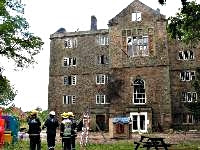 |
| Worksop Guardian |
My own information!
There are few Elizabethan houses about that can claim originality. This one is hardly that, but it is out of the way and would be able to offer great photographic opportunities. To say I was surprised to see this fine old house in the situation it is in fair shook me. I had planned the trip some months before the trip and never thought to update the possibility of any changes - lets face it it had been there 500 years and wasn't likely to go anywhere fast! How wrong.
 |
| My back is to the house. This is great country and would suit Sports facilities |
But there was more information forthcoming from a couple of dog walkers. They told me that the house had been empty for a while and then purchased by a consortium heavily supported by Sheffield United Football Club. Seemed rather strange but they were quite insistent on this matter. The name Steer was mentioned - he is a director. As the article above mentions, the police do think the fire was deliberate. Sheffield United were flying in top division at that time.
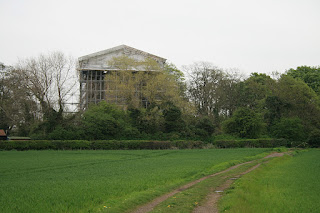 |
| Never seen so much scaffolding in my life - Except at Roslin |
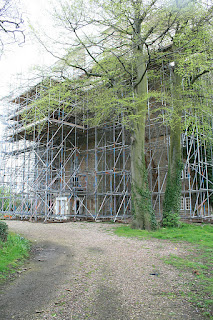 |
| The front drive. It was impossible to make out any detail at all |
 |
| The front entrance - compare this with other pictures |
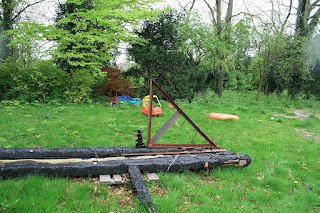 |
| Childs' toys amongst the burned out wood |
 |
| It seems the fire was started at the top of the house. Bit unusual if it was your usual druggie or hooligan. Don't normally like to be trapped anywhere. |
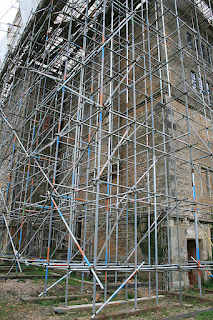 |
| Giant climbing frame! |
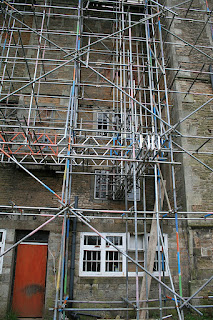 |
| Some idea of the stonework here! Small Elizabethan windows |
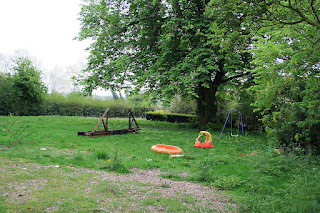 |
| View back towards Worksop |
Once more another change of hands!
Family from Thorpe Salvin and Shireoaks, just looking around and found this very interesting site. Hope "LazylikeSunday" pays another visit. Wonder what happened to the couple from Surrey who owned the property in 2002? Sounded like a mighty undertaking.
ReplyDelete